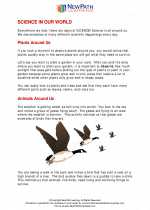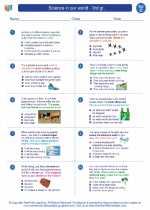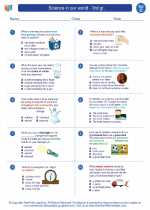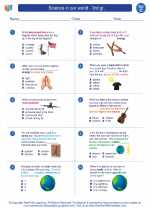Learned Behavior
Learned behavior refers to actions, reactions, and skills that an organism develops as a result of experience and interaction with its environment. These behaviors are not inherited genetically, but are instead acquired and modified through observation, teaching, and practice. Learning allows organisms to adapt to their surroundings and improve their chances for survival.
Types of Learned Behavior
There are several types of learned behavior, including:
- Imprinting: This occurs when an animal forms a strong attachment to another organism, typically its parent, during a critical period early in its life.
- Habituation: This is a decrease in response to a stimulus after repeated exposure to it. The organism learns to ignore a non-threatening stimulus.
- Classical Conditioning: This type of learning involves associating a previously neutral stimulus with a reflex response. Over time, the neutral stimulus elicits the same response as the original reflex.
- Operant Conditioning: This form of learning involves associating a behavior with a consequence. Behaviors that are rewarded are more likely to be repeated, while those that are punished are less likely to occur.
- Insight Learning: This type of learning involves solving problems through understanding the relationships between the components of the problem, rather than through trial and error.
- Social Learning: Organisms learn by observing and imitating the behaviors of others in their social group.
Examples of Learned Behavior
Examples of learned behavior in animals include:
- Birdsong: Many species of birds learn their songs by listening to and mimicking the songs of adult birds in their environment.
- Tool Use: Some primates, such as chimpanzees, learn to use tools for foraging or obtaining food by observing others in their group.
- Language Acquisition: Humans learn their native language through exposure to and interaction with others in their environment.
- Dancing: Some species of birds and mammals learn intricate courtship dances from adult members of their species.
Study Guide for Learned Behavior
To understand learned behavior, consider the following questions:
- What is the difference between innate behavior and learned behavior?
- How do animals benefit from learned behavior in their natural environment?
- What are the different types of learned behavior, and how do they differ from one another?
- Provide examples of learned behavior in different species and explain how these behaviors are acquired.
- What are the implications of understanding learned behavior for animal training and conservation efforts?
By exploring these questions, you can gain a deeper understanding of how organisms adapt and thrive through learning and experience.
.◂Science Worksheets and Study Guides Third Grade. Science in our world - 3rd gr.
Study Guide Science in our world - 3rd gr.
Science in our world - 3rd gr.  Worksheet/Answer key
Worksheet/Answer key Science in our world - 3rd gr.
Science in our world - 3rd gr.  Worksheet/Answer key
Worksheet/Answer key Science in our world - 3rd gr.
Science in our world - 3rd gr.  Worksheet/Answer key
Worksheet/Answer key Science in our world - 3rd gr.
Science in our world - 3rd gr.  Worksheet/Answer key
Worksheet/Answer key Documenting Data
Documenting Data 

 Worksheet/Answer key
Worksheet/Answer key
 Worksheet/Answer key
Worksheet/Answer key
 Worksheet/Answer key
Worksheet/Answer key
 Worksheet/Answer key
Worksheet/Answer key

The resources above cover the following skills:
History and Nature of Science: A student should understand the history and nature of science. A student who meets the content standard should:
Develop an understanding that historical perspectives of scientific explanations demonstrate that scientific knowledge changes over time, building on prior knowledge.
Develop an understanding that scientific knowledge is ongoing and subject to change as new evidence becomes available through experimental and/or observational confirmation(s).